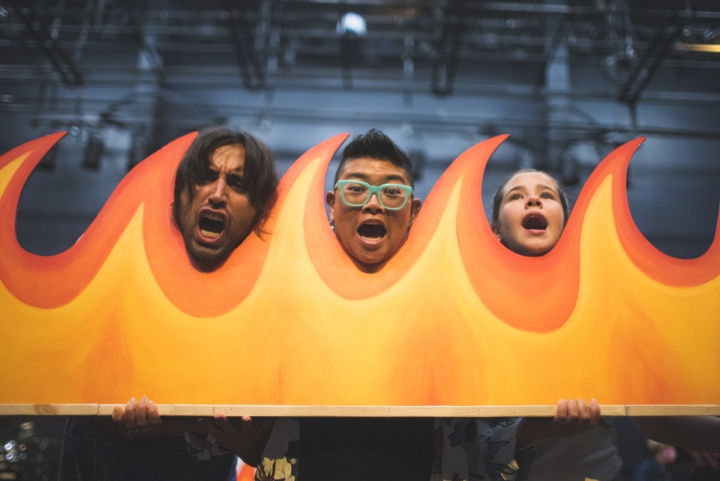With a major war in Europe and climate change affecting people around the world, it’s hard to imagine a more fitting time to stage a show that asks the audience to consider what creator César Alvarez calls the “terrifying feeling” about the way human beings have chosen to participate in the world, the wreckage those choices have wrought, and what possibility for survival remains.
The Hopkins Center for the Arts brings NOISE (a musical) to Northern Stage—a partner theater in White River Junction, Vt.—from July 27 to 30. The pioneering show tells the story of a bunch of musicians who agree that society isn’t working and decide to do something about it. By Act II, they’re inviting the audience to join in.
“It ends up being a sort of raucous ‘band-practice-at-the-commune’ exploration of togetherness,” says Alvarez, an assistant professor of music whose accolades include the Jonathan Larson Award, the Kleban Prize, and a Guggenheim Fellowship.

The production is a collaborative creation by Alvarez, director Sarah Benson, the cast, and the production team, and is the culmination of the company’s residency with the Hop in the preceding weeks. With playful, engaging dialogue and ever-changing, kaleidoscopic musical ensembles offering everything from a dance-inducing rap critiquing capitalism to a cautionary dirge sung by shrouded characters sure to give you the shivers, it’s a joyful go at conjuring a future worth hoping for.
NOISE ‘is going to be transformative’
A “very porous” musical, NOISE offers an opportunity for people to find their own path through the piece, says Benson, an Obie award-winning theater director who earlier this month stepped down after 15 years as a director of Soho Rep Theatre in New York.
Theatergoers choose their seats based on how involved they want to be in NOISE, which offers two types of tickets and an array of participatory opportunities along the way.
“I truly feel like this is a show so many people are going to find something very specific and distinctive to them that is going to be transformative,” Benson says.
Alvarez’s residency and new work build on the Hop’s tradition of supporting Dartmouth faculty in bringing their innovative artistic visions to life.
“This dynamic production shows us how the arts can speak, and even sing, to our current moment,” says Mary Lou Aleskie, the Howard Gilman ’44 Executive Director of the Hopkins Center. “NOISE dismantles society’s troubles and offers up a solution through a beautiful, joyful, and thought-provoking arts experience.”
The work follows last fall’s premiere of The Ritual of Breath Is the Rite to Resist, another Hop production and commission, which was created by Dartmouth and Stanford University faculty members. And the Hop is continuing to invest in new work and faculty partnerships.
Productions are currently being staged at venues on campus and throughout the region as the Hop undergoes a major renovation and expansion.
Wild, multidisciplinary, and community-based
The cast and crew of this first professional production of the musical draw heavily from Dartmouth and the Upper Valley. That’s by design, says Alvarez, who lives in Strafford, Vt., with their partner and collaborator Emily Orling, the set and prop designer, and their three children, among them Ommy Alvarez-Orling, who is making her professional theater debut at age 12.

Other local residents involved with NOISE include Nando Jaramillo, owner of Vermont-based Moon and Stars Arepas and an agricultural activist who is the team’s culinary curator, and artist Rachel Bernsen, the show’s choreographer.
Julia Havard, a recent Mellon Postdoctoral Fellow in the Department of Theater, is the show’s accessibility consultant. And a number of Guarini School of Graduate and Advanced Studies students and alumni are also bringing their expertise to the production: digital musics student Charles Peoples III is assistant director, and Guarini alums Piper Hill and Olivia Shortt are the associate music director and supertitle designer/Indigenous consultant, respectively.
“This isn’t only artists from New York coming to make a piece,” Alvarez says. “It’s also a community-based project.”
This production represents the realization of a dream several years in the making.
“I came here in in the middle of the pandemic in 2020 with the hopes that these big multidisciplinary works that I create can really find incubation and be born in the creative community of Dartmouth,” Alvarez says.
Listening, for radical possibilities
Inspiration for the show came from the book Noise: The Political Economy of Music, by French economist and social theorist Jacques Attali, which describes the musical impulse as an elemental impulse of organization, an ancient practice “that basically all human cultures participate in,” Alvarez says. “The decisions we make about how to organize ourselves are embedded in the decisions we make about how to organize sound.”
The musicians in NOISE figure that if music forecasts society, they should be able to create pieces that forecast a society they actually want to live in.
Having taken vastly different routes to the stage, in terms of both musical training and life experiences, the actors hold radically different perspectives, Alvarez says. The sounds they create together, and with the audience, are “the whole point of the show.”
“Here we are on Earth. We’re all coming from all these different perspectives. What society can we make that honors all of our different origins?”
Alvarez hopes that when audience members leave the theater, they will find themselves paying attention in a fresh new way to the sounds of people’s voices, and to who is speaking.
“What radical possibilities are available when we change our listening?” Alvarez says.
